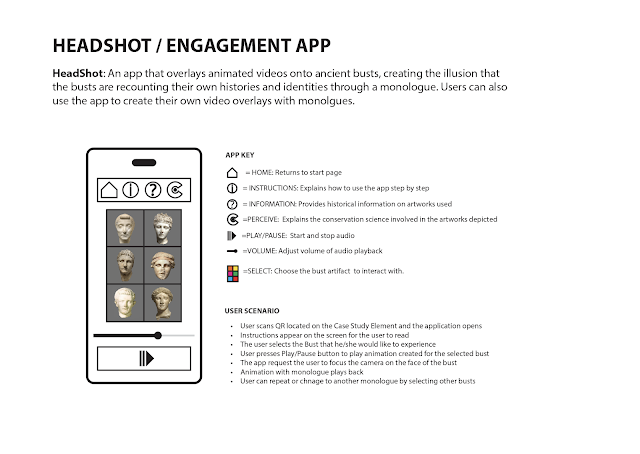0 ACTIVITY
Visitors use a 23cm basketball to throw it in a targeted manner through a designated hoop.The activity is brief, playful, and punctual, but not competitive or sport-oriented.
Headshots is part of an artistic concept and does not constitute a sports facility.
I CONSTRUCTION
Dimensions: 1m/1m/3m
Elements
Materials
Aluminum tubes 25 mm x 25 mm, 2mm thick
Plastic end caps
Stainless steel bolts, nuts and washers, 6mm
POM distance pieces 12 mm
Polycarbonate plates, 3mm (Panels)
Diverse montage elements
II INFORMATION
Description
HEADSHOTS: This element is designed to showcase case studies focused on polychromic sculptures from ancient times, notable for their distinct and captivating use of color. It takes the form of a tower containing two basketball hoops, a set of lenticular prints, and a digital counter. Visitors can engage in a provocative manner by throwing foam rubber copies of busts of historic figures through the basketball hoops to score points for the museum, with the digital counter tracking the number of interactions. Notably, as visitors prepare to score a point, their movements cause the lenticular prints mounted on the tower to "flip" between the original non-colored and the suggested recolored versions of the busts. Each bust has a QR code that can be scanned with a smart device to reveal the story of the person depicted. This is achieved by watching a video clip that overlays the face of the bust, making it appear as if the bust is telling its own story.
 |
Fig.1. Mock up sketch of the HEADSHOTS element |
Technical Elaboration
The HEADSHOT scenario has been meticulously formulated to serve as a platform for showcasing case studies focused on polychromic sculptures from ancient times, notable for their distinct and captivating use of color. This design approach is thoughtfully conceptualized to seamlessly integrate within the encompassing framework of the Open Museum, enhancing the overall narrative and interaction with the other content.
Construction
Depending on the version of HEADSHOTS, the element uses a set of one or three space frame cubes constructed out of aluminum (d-bond) profile and plates. The spaces frame cubes are stacked upon one another for form a tower. The plates of the tower are used to mount the following elements:
ElementsSpace Frame Elements: The space frame elements are used as a mount for all the individual elements of the HEADSHOTS element.
Lenticular Print Plates: The lenticular print used for this element consists of a "flip" of one or more of a before-and-after restoration of one or more of the case study busts (most likely the Head of Isis in various colorings). For each side of the tower, there is one version of the bust on a two image lenticular print.
Basketball hoops: One or more basketball hoop are mounted at the top element of the tower and is used as “participation counter” which measures the number of visitors actively participating.
3 to 5 Foam Reproduction of Busts: Foam replications of busts taken from diverse antique Sculptures are created to be used as basketballs and story telling objects. Basically, the foam bust reproduction is part of an engagement strategy that lets visitors use them as a basketball which they can through a basketball hoop mounted on to the upper element of the space frame.
Option: A single "non binary bust will be created in multiple and then used to as a projection space for video monologues containing the images of the other busts.
1 Large Digital LED Counter: The counter is mounted on the middle plate above or under one or more of the basketball hoop. The counters are used to measure the number of active participants visiting the element, but other scenarios can be used, for example, with each “point score” a certain amount is donated to a fund in support of cultural heritage work.
Scenario
The space frame element serves as the foundational support structure for all constituent components within the HEADSHOTS element. Within this framework, the foam bust reproduction assumes a dual role—forming a central part of an innovative engagement strategy. This strategy invites visitors to interact with the foam bust by employing it as a basketball, which they can then attempt to shoot through a basketball hoop that is thoughtfully integrated onto the Space Frame.
The functionality of the HEADSHOTS element unfolds as viewers maneuver around the foam bust, enabling them to observe the accompanying lenticular image from various angles while aiming to make a successful basketball shot. Depending on the angle chosen for the shot, viewers are presented with distinct visual juxtapositions: the contrast between the sculpture's (possible) original state of coloration and its current appearance as a pristine white stone.
This effect is orchestrated through the "basketball engagement strategy," which prompts viewers to select a position from which to launch the foam bust through the hoop mounted on the space frame. Upon successful passage through the hoop, the visitor's achievement is registered on a digital LED counter. This counter not only documents the individual's success but also contributes to a comprehensive record of visitor engagement, underscoring the level of participation and interaction with the exhibit.
>Application opens Instructions appear on the screen for the user to read;
>The user selects the Bust that he/she would like to experience;
>User presses Play/Pause button to play animation created for the selected bust;
>The app request the user to focus the camera on the face of the bust;
>Animation with monologue plays back;
>User can repeat or chnage to another monologue by selecting other busts.
 |
Treu Head 140-150 AD British Museum, London |










